

Schools - Teachers - English - KS1 lesson plans. Home - How To Train Your Dragon. Key Stage 2 Literacy Non- fiction Year 6 Formal / Impersonal Writing. Formal/impersonal writing (3 weeks)Scroll down for free resources Formal Writing: This is a summative non-fiction unit designed to be taught towards the end of the school year.
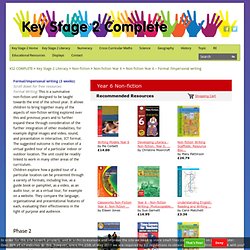
It allows children to bring together many of the aspects of non-fiction writing explored over this and previous years and to further expand these through consideration of the further integration of other modalities, for example digital images and video, sound, and presentation in interactive, ICT format. The suggested outcome is the creation of a virtual guided tour of a particular indoor or outdoor location. The unit could be readily linked to work in many other areas of the curriculum.
"Effective Teachers of Literacy" This study was commissioned to help the Teacher Training Agency and teachers in England to understand more clearly how effective teachers help children to become literate.
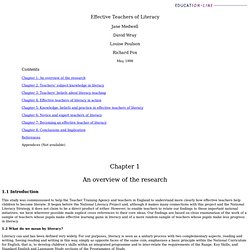
It began before the National Literacy Project and, although it makes many connections with this project and the National Literacy Strategy, it does not claim to be a direct product of either. Reading Comprehension & Language Arts Teaching Strategies for Kids. Interactive Books in the Primary Classroom. A trawl through the ‘books’ section of the app store turns up hundreds and hundreds of stories – not all of which will be that useful in the classroom.
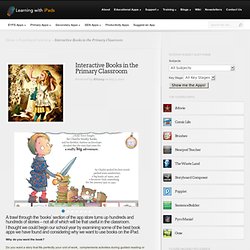
I thought we could begin our school year by examining some of the best book apps we have found and considering why we want to use books on the iPad. Why do you want the book? Do you want a story that fits perfectly your unit of work, complements activities during guided reading or allows the child to read independently? Ask yourself what putting the book on the iPad will achieve – are some children more motivated to read this way? Yr4 persuasive writing. Effective Writing Skills. KS2 Literacy.
Different types of words can be used to make your writing more interesting and easier to read.
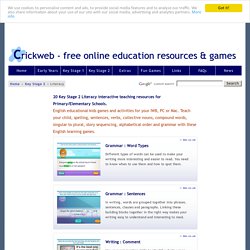
You need to know when to use them and how to spot them. In writing, words are grouped together into phrases, sentences, clauses and paragraphs. Linking these building blocks together in the right way makes your writing easy to understand and interesting to read. Use your commenting skills to identify what's wrong with these pieces of writing. When you are writing non-fiction it's important to use a style of writing that fits the subject.Use your knowledge of non-fiction writing to group the correct titles, text and pictures together. © v2vtraining.co.uk The Look, Say, Cover, Write & Check is a support tool for learning spellings using a trusted multi-sensory approach. This activity helps prove the rules of changing nouns from singular to plural. This is an activity targeted to Year 4 to help with medium frequency words.
An updated version of the traditional word guess game. Fairytale Storytelling Basket - The Imagination Tree - (Current Session: This 18-05-13) Create a story basket full of storytelling props to retell favourite fairy tales together in a playful way!
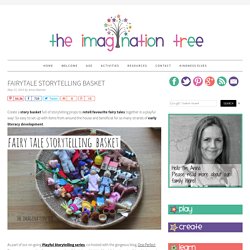
So easy to set up with items from around the house and beneficial for so many strands of early literacy development. As part of our on-going Playful Storytelling series, co-hosted with the gorgeous blog, One Perfect Day, we are presenting fun ways to explore fairy tales with kids. My children love traditional tales and they are my favourite type of story too because they can be told without books, thus celebrating and practising the essential art of oral storytelling together. Being able to tell a story without a book encourages greater eye contact, intonation and variation in voice, use of richer vocabulary and a closer bond during the process. Not to mention the simple fact that it means you can tell the stories wherever you are with no books needed, be it in the car, on a walk or waiting for an appointment!
What stories would you put in your basket? Cakie: 4.8 Pop: 3. 1. Literacy. Reading. Fry's Word List Activities. Literacy ideas. Literacy from Scratch Project - 123ICT. Literacy from Scratch is a web site that has been put together to demonstrate how teachers are using Scratch to develop interactive activities in any subject.
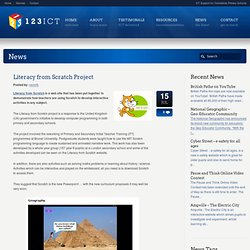
The Literacy from Scratch project is a response to the United Kingdom (UK) government’s initiative to develop computer programming in both primary and secondary schools. The project involved the reworking of Primary and Secondary Initial Teacher Training (ITT) programmes at Brunel University. Postgraduate students were taught how to use the MIT Scratch programming language to create sustained and animated narrative work. This work has also been developed by a whole year group (187 year 8 pupils) at a London secondary school and some of the activities developed can be seen on the Literacy from Scratch website. In addition, there are also activities such as solving maths problems or learning about history / science. They suggest that Scratch is the new Powerpoint … with the new curriculum proposals it may well be very soon.
KS1. Pixar 22 Rules of Storytelling. Word Worksheets. Spelling. Children's Books. Encouraging reading. Literacy #R. Unlikely Friendships.